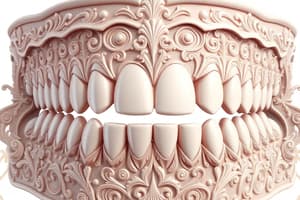Podcast
Questions and Answers
What is the primary reason for relieving undercuts in the cast?
What is the primary reason for relieving undercuts in the cast?
- To avoid scratching of the cast by the trial denture bases (correct)
- To ensure the trial denture bases are stable
- To allow for easier removal of the cast
- To enhance the aesthetics of the denture
Which characteristic is NOT required for the borders of the trial denture base?
Which characteristic is NOT required for the borders of the trial denture base?
- Angular and pointed design (correct)
- Free from sharp edges
- Conformity to the sulcus depth
- Smooth and round edges
What should be checked regarding the incisal pin during the evaluation of the mounted cast?
What should be checked regarding the incisal pin during the evaluation of the mounted cast?
- It should be loose for easy adjustments
- It must completely detach from the articulator
- It should be flush with the upper member of the articulator (correct)
- It should be above the upper member of the articulator
What test is performed on the denture for physical retention assessment?
What test is performed on the denture for physical retention assessment?
Why is it important to eliminate excess wax in denture preparation?
Why is it important to eliminate excess wax in denture preparation?
In assessing a denture, what is evaluated concerning the neutral zone?
In assessing a denture, what is evaluated concerning the neutral zone?
What is a common issue with the retention of lower dentures?
What is a common issue with the retention of lower dentures?
What factors should be assessed together when evaluating a denture?
What factors should be assessed together when evaluating a denture?
What is the main purpose of a trial denture?
What is the main purpose of a trial denture?
Which of the following is NOT an objective of the try-in procedure?
Which of the following is NOT an objective of the try-in procedure?
What is an essential component of the extraoral examination during the try-in stage?
What is an essential component of the extraoral examination during the try-in stage?
Which characteristic is critical for the master cast used in making dentures?
Which characteristic is critical for the master cast used in making dentures?
During trial placement, what is primarily assessed?
During trial placement, what is primarily assessed?
What step is critical in the process of making interocclusal maxillomandibular records?
What step is critical in the process of making interocclusal maxillomandibular records?
Which of the following is considered when assessing tooth selection during the try-in procedure?
Which of the following is considered when assessing tooth selection during the try-in procedure?
What is a common error that can occur if the master cast contains wax debris?
What is a common error that can occur if the master cast contains wax debris?
Flashcards are hidden until you start studying
Study Notes
Trial Denture Overview
- Preliminary arrangement of artificial teeth allows evaluation of esthetics, phonetics, and maxillomandibular relationships.
- Trial base acts as an interim material for removable dentures, aiding in maxillomandibular relationship records and wax-ups.
Importance of Trial Denture
- Provides final opportunity to review previous work before completion.
- Enables patient assessment of denture appearance.
- Identifies and corrects errors prior to final denture fabrication.
Objectives of Try-In Procedure
- Verifies maxillomandibular records established without teeth.
- Checks acceptance of vertical dimension.
- Ensures centric occlusion coincides with centric relation.
- Assesses compatibility of teeth position and denture base with oral tissues.
- Evaluates tooth selection and arrangement for aesthetic outcomes.
- Facilitates creation of additional interocclusal records for articulator adjustments.
Aspects of Try-In Stage
- Extraoral examination on articulators includes:
- Accuracy check of cast, denture base, and teeth relationships.
- Intraoral examination involves evaluating the trial denture in the patient’s mouth.
Extraoral Examination Requirements
- Master Cast Criteria:
- Should be well-shaped, free of air bubbles, scratches, and wax debris.
- Any present undercuts must be relieved to allow proper adaptation of trial denture bases.
- Trial Denture Base Requirements:
- Must be stable and have smooth, rounded borders with no sharp edges.
- Borders should conform to the depth and width of the sulci.
Articulator Checks
- Mounted cast assessments include:
- Maintaining vertical dimension of occlusion (incisal pin flush with articulator upper member).
- Firmly secured mounting rings.
- Smooth movement from centric to eccentric positions without cuspal interlocking.
- Proper placement of trial denture bases on casts with evenly meeting teeth in centric relation.
Tooth Selection and Adjustment
- Dentist responsible for selecting appropriate shade and shape of teeth and ensuring correct positioning.
- Elimination of excess wax is crucial to avoid false relationships or occlusion issues.
- Upper and lower teeth relationship to opposing ridges must be verified, particularly excessive anterior contact on articulator.
Trial Denture Assessment in the Mouth
- Individual assessments focus on:
- Physical retention and stability of the denture.
- Extension of denture bases and relationship to the neutral zone.
- Combined assessments evaluate:
- Vertical dimension (VD) and centric relation (CR) position.
- Aesthetic and phonetic compatibility.
- Establishment of the posterior palatal seal.
Retention Factors
- Good upper jaw prognosis should lead to difficult dislodgment.
- Lower dentures often experience poor retention due to smaller denture-bearing area and border seal challenges.
Studying That Suits You
Use AI to generate personalized quizzes and flashcards to suit your learning preferences.




